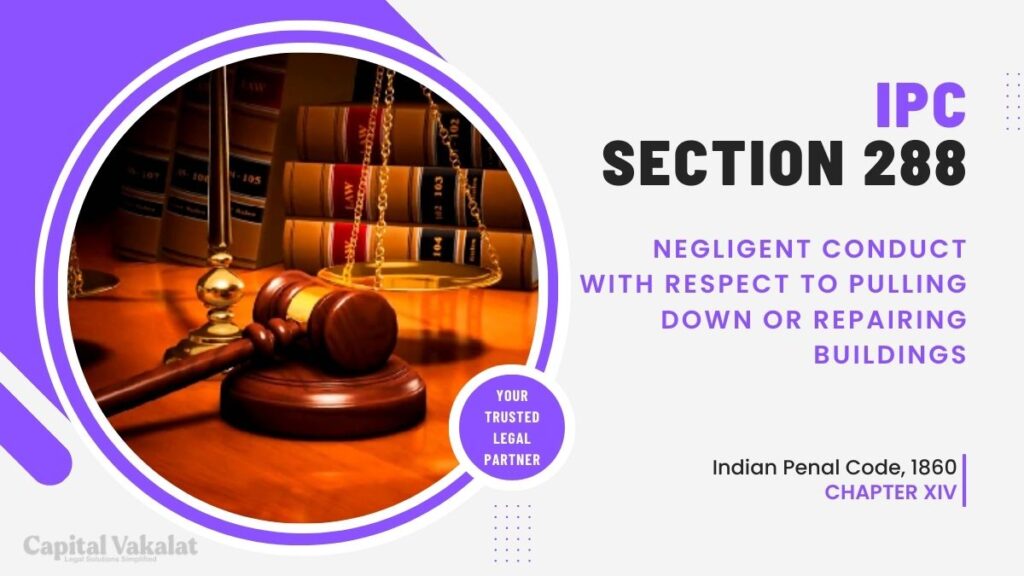The demolition and repair of buildings are complex tasks that require meticulous planning and execution. When not carried out with due diligence, they can result in disastrous consequences, including loss of life and property damage. To address such situations, the Indian Penal Code (IPC) includes specific provisions under Section 288 to deal with negligent conduct in pulling down or repairing buildings.

In this article, we will explore the details of Section 288 IPC, its implications, and the importance of ensuring safety in these activities.
Introduction to Section 288 IPC
Section 288 of the Indian Penal Code (IPC) deals with the offense of negligent conduct with respect to pulling down or repairing buildings. This provision is crucial in maintaining safety standards and accountability in the construction and demolition industry. It aims to deter individuals and entities from engaging in negligent conduct that can endanger lives and property.
Understanding Negligent Conduct in Building Demolition or Repair
Negligent conduct in the context of building demolition or repair refers to actions or omissions that demonstrate a lack of proper care, caution, or responsibility in the process. This negligence can lead to accidents, injuries, and damage to neighboring properties.
Legal Provisions Under Section 288 IPC
Section 288 IPC provides the legal framework to deal with negligent conduct. It states that “Whoever, in pulling down or repairing any building, causes wrongful loss to any person or negligently does not take proper precautions to prevent such loss, or to prevent any probable danger to human life from such pulling down or repairing, shall be punished with imprisonment of either description for a term which may extend to six months, or with fine which may extend to one thousand rupees, or with both.”
In simpler terms, if an individual or entity causes harm or fails to take precautions while demolishing or repairing a building, they can face imprisonment, a fine, or both.
Elements of Negligent Conduct
To establish an offense under Section 288 IPC, the following elements must be proven:
- Wrongful Loss: There must be evidence of loss or damage caused to another person or their property.
- Negligence: The accused must be proven to have acted negligently, demonstrating a lack of proper care and caution.
- Failure to Take Precautions: It must be established that the accused did not take adequate precautions to prevent harm or danger to human life during the demolition or repair work.
Penalties and Consequences
Individuals or entities found guilty of negligent conduct under Section 288 IPC can face penalties that include imprisonment for up to six months, a fine of up to one thousand rupees, or both. These penalties serve as a deterrent and emphasize the importance of responsible behavior in building-related activities.
Case Examples
To illustrate the real-world implications of Section 288 IPC, let’s examine a couple of case examples:
Case 1: In a poorly planned demolition, debris fell onto a neighboring building, causing extensive damage. The individuals responsible were charged under Section 288 IPC and sentenced to both imprisonment and fines.
Case 2: During a repair project, inadequate safety measures led to a worker falling from a height, resulting in severe injuries. The construction company was held liable under Section 288 IPC for negligence.
Importance of Building Safety
The importance of building safety cannot be overstated. Negligent conduct in building demolition or repair not only jeopardizes lives and property but also undermines the trust and confidence in the construction industry. It is essential for all stakeholders, including property owners, contractors, and workers, to prioritize safety in their actions.
Prevention and Precautionary Measures
To avoid falling foul of Section 288 IPC and, more importantly, to protect lives and property, the following precautionary measures should be observed during building demolition or repair:
- Thorough Planning: Detailed planning that considers safety measures is crucial before initiating any building work.
- Qualified Professionals: Employ skilled and certified professionals who are well-versed in building practices.
- Safety Equipment: Ensure the availability and use of safety equipment, such as helmets, harnesses, and barricades.
- Regular Inspections: Regular inspections of the work site to identify and rectify potential safety hazards.
- Emergency Protocols: Develop and communicate emergency response protocols to address unforeseen situations.
Role of Authorities and Inspections
Government authorities and regulatory bodies play a significant role in ensuring building safety. Regular inspections and adherence to building codes and regulations are essential to prevent accidents. It is imperative for these authorities to enforce the law and hold negligent parties accountable.
Conclusion
Section 288 IPC is a crucial legal provision that addresses the issue of negligent conduct in building demolition or repair. It emphasizes the need for responsibility, care, and precaution in activities that can have severe consequences if not executed properly. Building safety should be a collective priority, and adherence to the law is essential to protect lives and property.
Frequently Asked Questions
What are the penalties for a violation of Section 288 IPC?
Violators can face imprisonment for up to six months, a fine of up to one thousand rupees, or both.
Why is building safety crucial during demolition and repair work?
Building safety is essential to prevent accidents, protect lives, and safeguard property. Negligent conduct in these activities can have severe consequences.
How can individuals and entities ensure building safety during demolition or repair?
Ensuring thorough planning, employing qualified professionals, using safety equipment, conducting regular inspections, and having emergency protocols in place are key measures to ensure building safety.
What is the role of government authorities and inspections in building safety?
Government authorities and inspections are crucial for enforcing safety regulations and building codes, which help prevent accidents and hold negligent parties accountable.